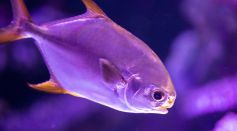Tags: Evolution
Newly Discovered Dinosaur Had Arms Smaller Than T. Rex, Raises Questions About Evolution of Abelisaurid Theropods

Barber-Surgeons to AI: The Evolution of Dentistry and 'Tick' Begg’s Pioneering Role
Musankwa Sanyatiensis: New Dinosaur Species Discovered in Zimbabwe Sheds Light on Early Evolution
Human Evolution Continues; Captivating Ways We Evolve That Could Lead to Generation of Individuals With Attractive Traits

German Cockroach's Global Journey Decoded: Unveiling Evolution and Spread Secrets

Size Plays a Role in Evolution; Small Organisms Have Advantage Over Big Counterparts
Blind Pinkish Fish Found in Underwater Cave in China May Hold the Answer to the Mysteries of Evolution
Earth's Magnetic Field Nearly Collapsed 600 Million Years Ago, Sparking Evolution of More Complex Life
![Bats Show First Evidence of Parallel Evolution in Mammal Species in Real-Time [Study]](https://d.sciencetimes.com/en/full/53277/bats-show-first-evidence-parallel-evolution-mammal-species-real-time-study.jpg?w=237&h=131&f=451725f365f4803f6989571c84cdf05f)
Bats Show First Evidence of Parallel Evolution in Mammal Species in Real-Time [Study]
Human Evolution Is Not Only Driven by Climate Change, Competition Plays a Part Too [Study]
Fossil Record of Dinosaurs and Mammals Challenges Bergmann’s Rule, Debunks Role of Latitude as Predictor of Body Size Diversity
First Nitrogen-Fixing Organelle Discovered in a Marine Alga, Provides Insight on the Role of Symbiotic Interactions to Evolution of Chloroplast and Mitochondria

4 Fossils From the Jurassic Era Offer New Insight About Human Ears, Teeth Evolution
Human Extinction: How Plummeting Birth Rates Threaten Our Species' Existence
What Can Whale Menopause Tell About Human Evolution? New Study Sheds Light on This Evolutionary Enigma
Living Fossils Offer Fundamental Demonstration of Evolutionary Process [Study]
Mammals’ Predatory Ancestors Developed Killer Instinct That Drove Evolutionary Success, Study Suggests
Snakes Evolve 3 Times Faster Than Lizards [Study]

Evolutionary Puzzle: Understanding Why Humans Lack Gills Despite Their Fish Ancestry

Mummified Animals in the 1800s Used To Study Evolution and Transformation, But Claims Weren’t Proven True
Most Popular

Trump Administration Declares COVID-19 Likely Originated from Wuhan Lab Leak, Citing Scientific Evidence

Largest Known Volcanic Aquifer Discovered Beneath Oregon's Cascades

New 'Supergiant' Sea Bug Found in South China Sea, Named After Darth Vader

Mediterranean Sea Was Refilled by a Catastrophic Flood Millions of Years Ago





